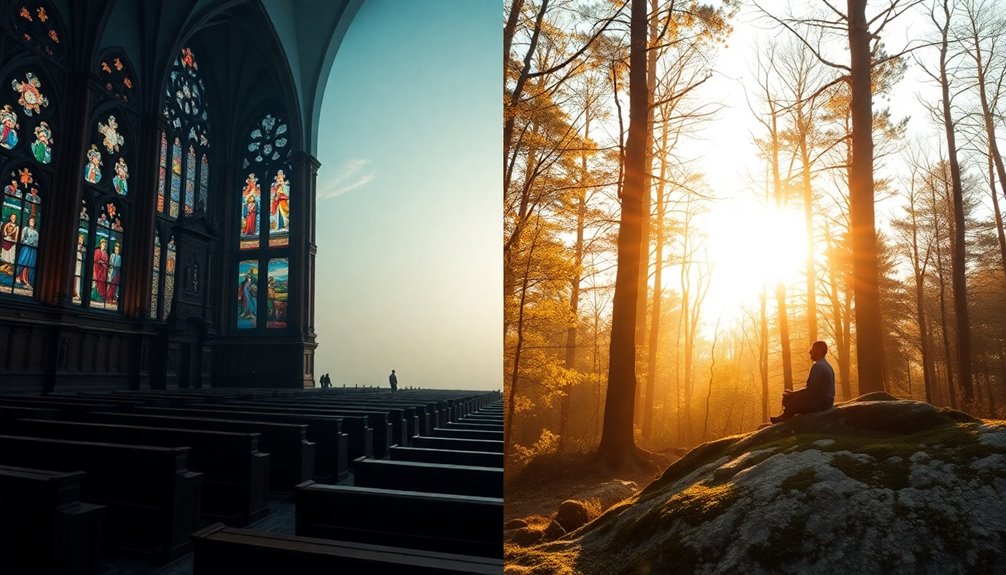Religion and spirituality provide unique paths for exploring the divine and your personal existence. Religion is structured, featuring formal beliefs, rituals, and communal worship, creating a sense of belonging. In contrast, spirituality emphasizes individual experience, self-discovery, and personal connection to the divine, allowing for greater flexibility in beliefs. While religion often focuses on shared practices and historical texts, spirituality encourages personal growth and exploration without strict boundaries. Many people now identify as "spiritual but not religious," seeking meaning outside traditional frameworks. If you're curious about how these differences shape modern life, there's much more to uncover.
Key Takeaways
- Religion is a structured system with formal beliefs and communal worship, while spirituality emphasizes individual experiences and personal connections to the divine.
- Spirituality allows for personal exploration and growth without fixed boundaries, whereas religion often adheres to established doctrines and practices.
- Religion fosters a sense of belonging through shared rituals and identity, while spirituality promotes self-awareness and personal meaning.
- Conflicts between differing beliefs historically arose in religion, but modern spirituality embraces diverse interpretations and individual perspectives.
- Spirituality integrates scientific principles, like mindfulness, to enhance mental health, contrasting with religion's focus on historical scriptures and hierarchical leadership.
Defining Religion and Spirituality
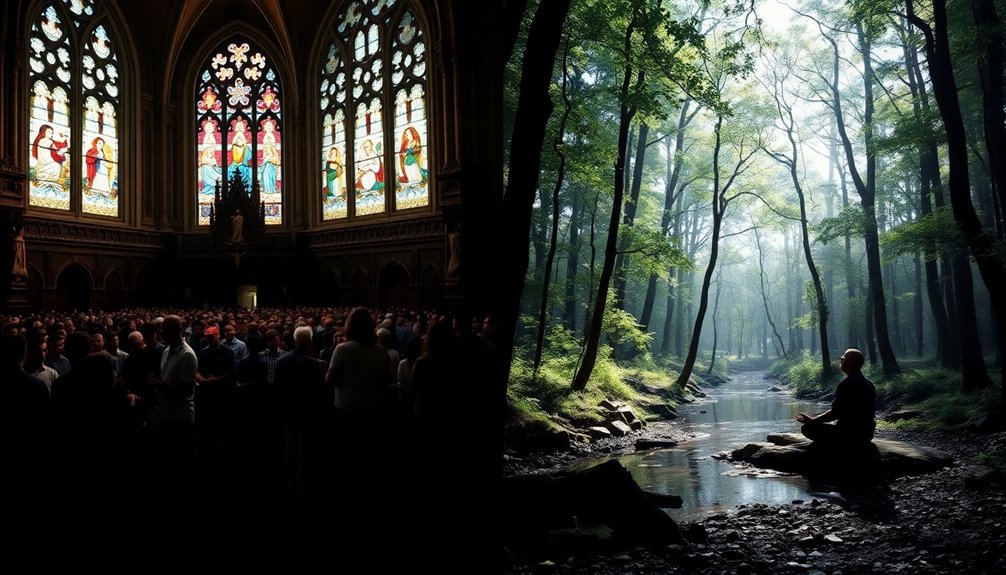
When you explore the concepts of religion and spirituality, you'll find that they represent distinct yet interconnected paths toward understanding existence and meaning.
Religion is a structured system of beliefs, rituals, and practices that often involves communal worship and adherence to specific doctrines. The belief systems within religion are typically guided by hierarchical leadership, historical scriptures, and established dogmas. This communal aspect fosters a sense of belonging and shared identity among followers.
On the other hand, spirituality emphasizes individual autonomy and personal experiences. It focuses on self-discovery and fosters a personal connection to the divine, often transcending organized beliefs and practices. While religion tends to require adherence to collective beliefs, spirituality encourages exploration, observation, and personal interpretation without rigid constraints.
Both concepts address fundamental questions of existence and meaning, but they do so in different ways. Religion often emphasizes external practices and obligations, while spirituality prioritizes inner experiences and personal growth.
Understanding these definitions helps clarify the unique roles that religion and spirituality play in people's lives, guiding their journey toward meaning and purpose.
Core Differences Between the Two
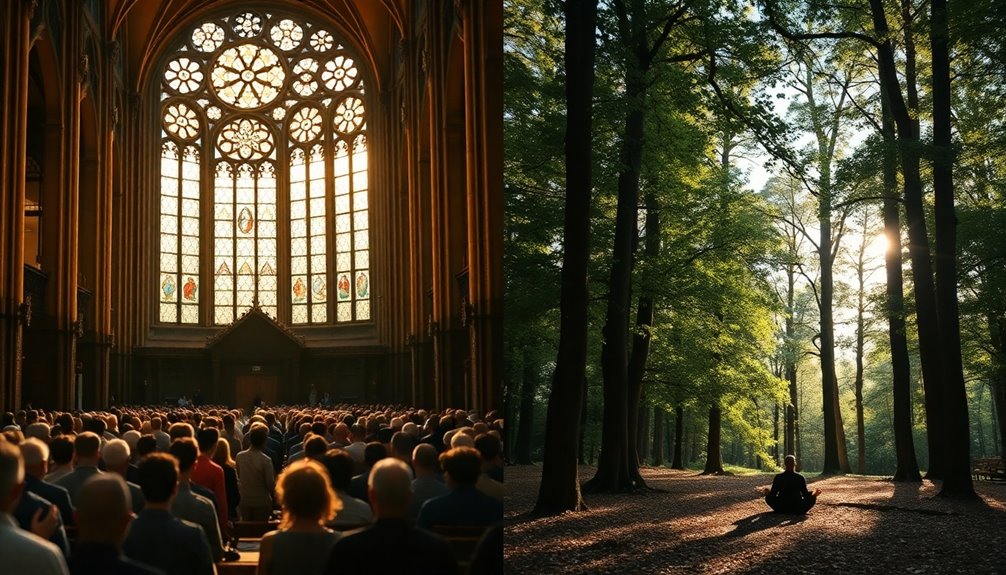
At their core, religion and spirituality diverge markedly in how they approach the quest for meaning and understanding. Religion is structured, often characterized by formal beliefs, rituals, and communal worship. You might find yourself adhering to specific doctrines and dogmas, which can impose a sense of obedience and conformity.
Spirituality, on the other hand, encourages you to explore your individual experiences and personal growth without fixed boundaries. It emphasizes subjective interpretations of the divine, allowing for a more personal connection to the universe.
While religion often discusses concepts like sin and guilt, spirituality focuses on self-awareness and principles like karma, promoting responsibility for your actions. You may appreciate that religion fosters a sense of community through shared practices, but spirituality prioritizes your unique journey toward understanding.
The trend of identifying as "spiritual but not religious" highlights a growing desire for personal meaning outside organized structures. Ultimately, both paths offer valuable insights, yet they cater to different needs: religion provides a framework, while spirituality invites you to initiate a deeply personal exploration of beliefs.
Historical Context and Evolution
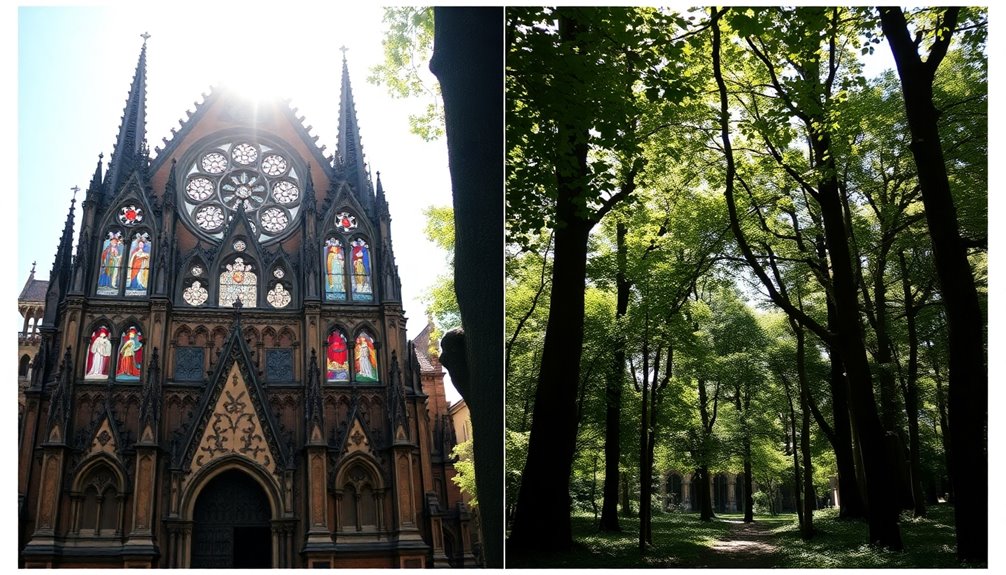
When you look at spirituality's roots, you'll see it as the foundation of many religious movements, with figures like Buddha and Jesus emphasizing personal experience over strict doctrine.
Over time, these original spiritual insights often got lost as religions evolved into more structured organizations.
Today, you might notice a shift where spirituality embraces scientific principles, reflecting a desire for personal exploration beyond traditional beliefs.
Spirituality's Historical Roots
Throughout history, spirituality has acted as the foundation for various religious movements, with figures like Buddha and Jesus personifying its fundamental principles. These early leaders emphasized a deep connection to something greater than themselves, laying the groundwork for beliefs that would evolve into organized religions.
However, as these movements grew, their original spiritual essence often became diluted, transforming intimate practices into rigid institutional rituals. Conflicts between differing spiritual beliefs have frequently emerged, yet modern spirituality now embraces a diverse array of interpretations, often stepping beyond traditional religious confines.
You might notice a growing trend where individuals identify as "spiritual but not religious," reflecting a shift towards personal exploration over collective worship. This evolution highlights a desire for individual spiritual journeys that prioritize personal connection to something profound rather than strict adherence to dogma.
Current trends indicate a blend of spirituality with scientific principles, aiming to eliminate superstitions and foster a more nuanced understanding of belief systems. As you explore these historical roots, it becomes clear that spirituality remains a crucial aspect of human experience, continuously adapting to meet the needs and desires of individuals seeking deeper meaning.
Evolution of Religious Movements
Religious movements have evolved considerably over time, shaped by cultural contexts and the charismatic leaders who sparked them. Figures like Buddha and Jesus emphasized personal spiritual experiences, laying the groundwork for major religions. Initially, these movements thrived on individual spiritual beliefs, but as they gained followers, their original essence often became diluted. Rigid dogmas emerged, overshadowing those intimate experiences that once defined them.
As you explore the evolution of religious movements, notice how many shifted from personal practices to institutional rituals. This change was heavily influenced by societal acceptance and the desire for structure within communities.
Over time, spirituality began to reflect a broader scope, incorporating scientific principles and Eastern concepts like karma and reincarnation into modern practices.
Today, the rise of the "spiritual but not religious" movement marks a significant departure from organized religion. You can see this trend as a response to the need for personal exploration and understanding in spiritual matters, illustrating a shift towards valuing individual spirituality over collective religious structures.
This ongoing evolution highlights how religion and spirituality can intersect yet diverge in profound ways.
Spirituality's Role in Modern Life

Increasingly, people are turning to spirituality to find meaning in their lives amidst the chaos of modern existence. As organized religion's influence wanes, many identify as "spiritual but not religious," seeking personal fulfillment outside traditional practices.
This shift reflects a deep-rooted desire for meaning and purpose in a rapidly changing world.
Here are some key roles spirituality plays in modern life:
- Navigating Anxiety: Spirituality helps you cope with existential fears, offering comfort in uncertain times.
- Promoting Personal Growth: It encourages self-discovery and personal development, allowing you to explore your true self.
- Building Connections: Spirituality fosters deeper relationships, emphasizing unity and compassion in an increasingly interconnected society.
- Providing Coping Strategies: In a world filled with overindulgence and instant gratification, spirituality offers principles for living that nurture resilience and well-being. Additionally, the subconscious power of spirituality can enhance personal experiences, leading to deeper insights and manifestations of life goals.
Intersection of Spirituality and Science
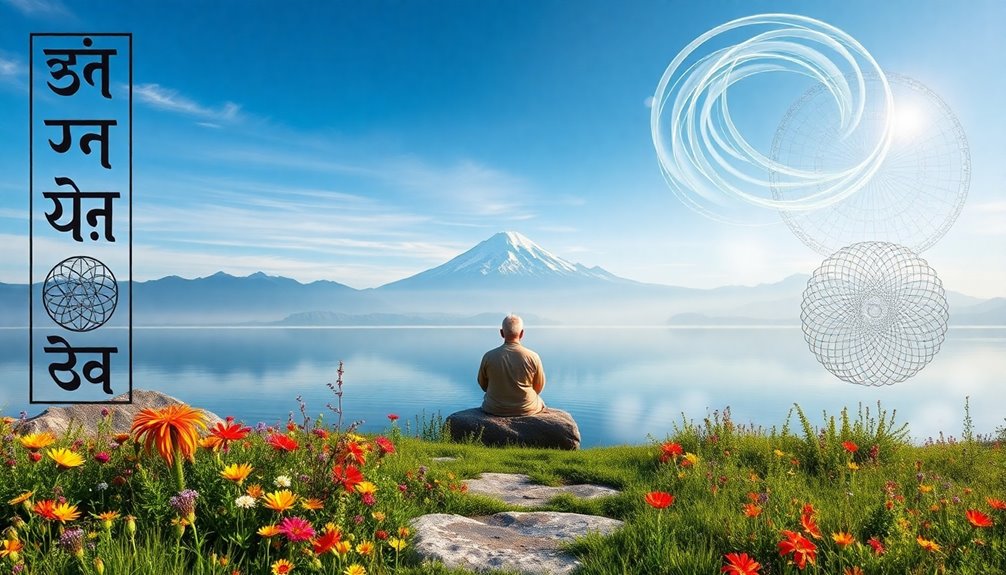
You might find it fascinating how science and spiritual practices often come together in surprising ways.
Research shows that activities like meditation can improve mental health, while spiritual concepts challenge scientific thinking about interconnectedness.
As you explore this intersection, consider how empirical evidence and personal experiences can create a richer understanding of life's meaning.
Science and Spiritual Practices
The growing interest in mindfulness and meditation illustrates a fascinating overlap between spirituality and science. As you explore this intersection, you'll discover how spiritual practices can enhance your life while being backed by scientific research.
Here are four key aspects to reflect upon:
- Mindfulness and Mental Health: Scientific studies show that mindfulness practices improve mental health, reducing anxiety and depression.
- Brain Activation: Engaging in spiritual activities like prayer and meditation activates regions of the brain associated with emotional regulation and well-being.
- Therapeutic Relevance: Concepts from Eastern spirituality, such as karma, have been integrated into psychological frameworks, proving that spirituality brings valuable insights into therapeutic settings.
- Neurotheology: This emerging field investigates how spiritual experiences correlate with brain activity, suggesting that seeking a higher power can coexist with scientific inquiry into consciousness.
Empirical Evidence vs. Experience
At the heart of the debate between empirical evidence and personal experience lies a rich tapestry of understanding that shapes our perception of reality.
You might find that spirituality often prioritizes personal experiences, considering them valid forms of knowledge. In contrast, science leans heavily on empirical evidence and systematic observation to establish truths about the universe.
When you explore practices like meditation, you see the intersection of spirituality and science; research demonstrates its benefits for mental well-being and stress reduction.
Concepts like mindfulness, rooted in spiritual traditions, have gained scientific validation for their positive effects on cognitive function and emotional regulation.
You might notice that spirituality can incorporate scientific findings, such as insights into consciousness, while emphasizing your individual interpretation.
Significantly, figures in psychology and neuroscience advocate for integrating spiritual practices into therapeutic settings, showcasing their effectiveness in promoting holistic well-being.
In this landscape, where empirical evidence meets personal experience, you can appreciate the richness of both spiritual insights and scientific inquiry, ultimately enriching your understanding of the complex nature of reality and religious faith.
Bridging Knowledge and Meaning
Exploring the intersection of spirituality and science reveals a fascinating landscape where knowledge and meaning coalesce. As you investigate this domain, you'll notice how these two fields inform each other, creating a richer understanding of existence.
Here are four key aspects:
- Mindfulness and Meditation: These practices, rooted in spirituality, are backed by scientific research showing their benefits for mental health and well-being.
- Collaborative Inquiry: There's a growing trend of scientists and spiritual leaders working together, enhancing our understanding of consciousness and the human experience.
- Integrative Concepts: Ideas like karma and reincarnation are being examined through a scientific lens, leading to personal growth and self-discovery.
- Personal Meaning: The "spiritual but not religious" movement illustrates a shift where individuals curate their own set of beliefs, seeking deeper meaning in life through both spiritual insights and scientific principles. Moreover, practices like yoga for back pain are increasingly recognized for their holistic benefits, merging physical health with spiritual well-being.
In this dynamic interplay, spirituality vs religion becomes less about opposition and more about collaboration, offering a holistic view that addresses existential questions while nurturing your personal journey.
Cultural Impact and Personal Experience
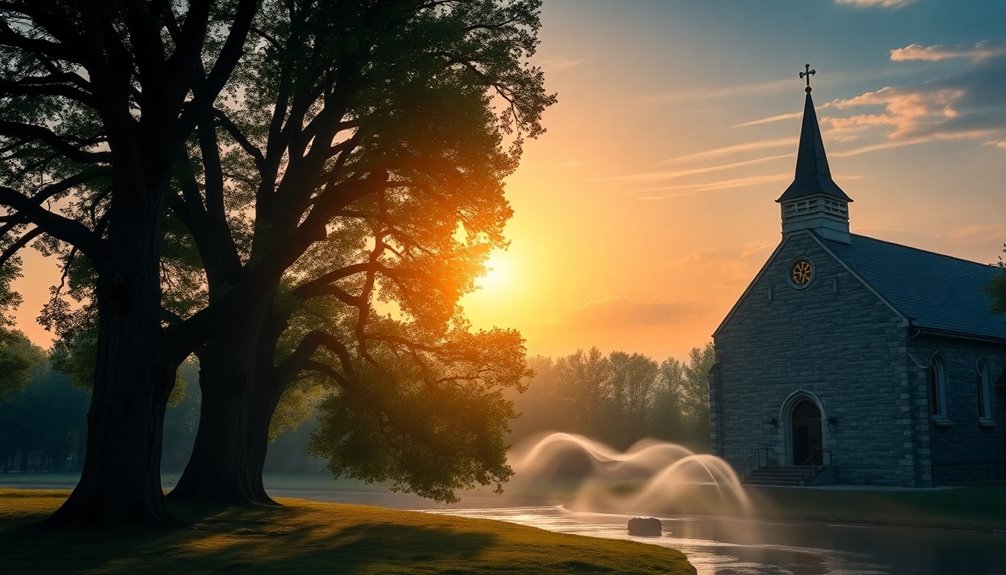
Religion and spirituality profoundly influence cultural practices and personal experiences, shaping how individuals connect with their communities and themselves.
Religion often lays down structured beliefs and rituals that guide ethical norms, holidays, and community gatherings. This framework fosters a sense of belonging and identity, knitting communal ties that bind people together.
In contrast, spirituality emphasizes individual interpretation and personal journeys, allowing for diverse expressions of belief that can flourish outside traditional structures.
As you explore your spirituality, you might find it leads to a deeper understanding of yourself and your place in the world.
The rise of spirituality in modern society has broken down barriers between different cultural beliefs, promoting interfaith dialogues and acceptance of diverse practices. This shift reflects a growing desire for personal meaning and fulfillment, particularly among those identifying as "spiritual but not religious."
In this context, your experiences can mirror broader cultural trends, highlighting how personal journeys shape and are shaped by the intricate dance between religion and spirituality.
Ultimately, both domains intertwine, influencing how you engage with the world and the communities around you.
Future Directions for Spirituality and Religion
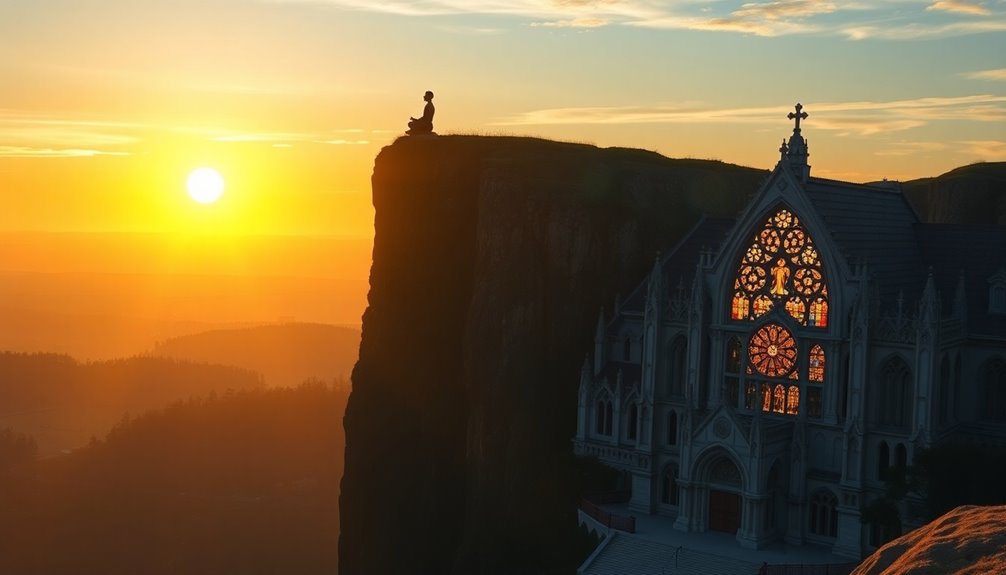
As personal journeys continue to evolve, the future of spirituality and religion looks increasingly interconnected. You might notice several key trends shaping this landscape:
- Collaboration with Science: The partnership between science and spirituality is set to deepen, enhancing our understanding of consciousness and existence.
- Rise of SBNR: More individuals are identifying as "spiritual but not religious," reflecting a shift towards personal spirituality outside organized structures.
- Scientific Integration in Practices: Future spiritual practices may incorporate scientific principles, bridging empirical evidence with personal experiences.
- Interfaith Dialogues: There's a growing emphasis on interfaith dialogues, promoting collaboration and understanding among diverse religious and spiritual groups.
These trends suggest that spirituality will increasingly permeate holistic health approaches, playing a significant role in addressing mental health and well-being.
As you navigate your own spiritual journey, you might find these developments not only relevant but also empowering. By embracing both spirituality and religion, you can contribute to a more inclusive and harmonious world where understanding and acceptance thrive.
Frequently Asked Questions
What Is Spirituality and How Does It Differ From Religion?
Spirituality is all about your personal journey and connection to the divine. It encourages you to explore your beliefs, seek inner peace, and grow through your experiences.
Unlike religion, which often has strict rules and collective practices, spirituality allows for individual interpretation and autonomy. You can find meaning in your own way, without the need for dogma or authority figures.
It's a path focused on personal insight and self-discovery.
What Is the Main Difference Between Spirituality and Religion in Quizlet?
When you're comparing spirituality and religion on Quizlet, the main difference lies in structure versus individuality.
Religion's an organized system with established doctrines and communal practices, while spirituality's a personal journey focused on self-discovery and individual experience.
You'll find that religion often emphasizes external rituals and belonging to a community, whereas spirituality encourages you to explore your own beliefs and connect with the divine in a more intimate, personal way.
What Is the Difference Between Spiritual and Religious Experiences?
When you think about spiritual versus religious experiences, consider them like different paths up a mountain.
Religious experiences often guide you along a well-trodden trail with signs and fellow travelers, offering structure and community.
In contrast, spiritual experiences invite you to wander freely, discovering hidden views and insights.
While one emphasizes shared beliefs and rituals, the other encourages personal exploration and connection to the universe, leading to unique, transformative moments in your journey.
What Do You Believe Are the Differences and Overlaps Between Spirituality and Religion?
You might see spirituality and religion as two different paths to understanding life's big questions.
Spirituality often invites you to explore personal beliefs and foster a unique connection with the universe. In contrast, religion provides structured practices, communal worship, and established doctrines.
However, they overlap; both seek meaning and offer comfort in times of uncertainty.
Ultimately, your journey can blend the two, allowing you to find what resonates most deeply with you.
Conclusion
In the grand scheme of things, understanding the differences between religion and spirituality can help you navigate your own beliefs and experiences. While religion often provides structure and community, spirituality invites personal exploration and connection. As both evolve, they continue to shape our lives in unique ways. Embracing this journey not only enriches your perspective but also opens doors to deeper understanding and fulfillment. So, whether you're searching for answers or simply seeking peace, you've got plenty of paths to explore.
